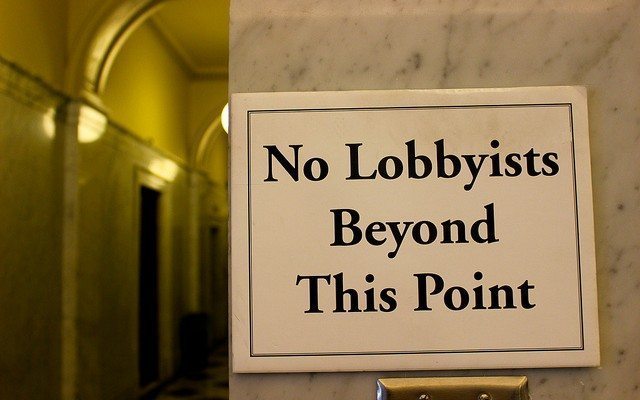 Image courtesy of [Danny Huizinga via Flickr]
Image courtesy of [Danny Huizinga via Flickr]
Politics
Lobbying: Washington’s Dirty Little Secret?
For some, the term “lobbying” evokes the thought of fat cat plutocrats piping money into Congress to keep their interests and deep pockets protected. But while voting is the most fundamental aspect of a democracy, lobbying–for better or worse–is one of the most direct ways to influence policy making. Read on to learn about the lobbying system in the United States, as well as the benefits and negative effects of this system.
What is lobbying?
Lobbying is a right protected by the First Amendment of the U.S. Constitution, and ultimately allows citizens to shape legislators’ decisions. U.S. citizens have the right to petition, free speech, and freedom of the press, so when citizens want to influence government policy, they are constitutionally protected.
Those who hire lobbyists are usually called special interest groups–groups of people who use advocacy to influence policy and public opinion.
Types of Lobbying
There are two core types of lobbying: inside and outside. Inside lobbying occurs when individuals contact their legislators directly, mostly through phone calls and letters. Outside lobbying is when citizens or interest groups form campaigns or organizations to influence public opinion or to pressure policymakers.
Types of Lobbyists
While lobbying by businesses that see a particular benefit in swaying our lawmakers is very common, there are other motivations for lobbying as well. Unions, for example, also lobby for issues pertaining to taxes, workers’ rights, and the minimum wage, just to name a few.
Religious lobbying is another good example. The head of a church or religious organization might lobby Congress to denounce a bill that would not fit the view of the congregation. The number of religious lobbying organizations has increased from less than 40 in 1970 to more than 200 in 2012. Catholic organizations lead the way, making up 19 percent of all religious lobbying groups. So, lobbying isn’t just about the money, it can take the form of moral or personal interests as well.
Lobbying is not only popular on the federal level, but also at the state level. A 2006 survey by the Center for Public Integrity reported that there were 40,000 paid lobbyists working with state legislatures, with that number expected to rise. Other lobbying efforts are even more local. Trying to persuade a city council to halt something like a construction project to preserve wildlife is another common example of lobbying.
When is the best time for lobbying efforts?
Lobbying is most common weeks before a bill is set to be voted on, when proponents of the bill gather to discuss how they will go about presenting the initiative. Another common time to see lobbyists is during election season. This time is crucial as lobbyists can put more pressure on members of Congress to please their constituents and recognize the immediate effect of voting against their constituents’ opinions.
Show Me the Money: Lobbyists and Spending
The amount of money spent on lobbying since the late 1990s has increased dramatically, despite fluctuations in the number of lobbyists. According to the Center for Responsive Politics’ Open Secrets, in 1998 there were 10,405 individual lobbyists and lobbying spending totaled $1.45 billion. In 2010 there were 12,948 lobbyists, and spending totaled a high of $3.52 billion. This means that there was a 24 percent increase in lobbyists, and a staggering 143 percent increase in total spending. Fewer lobbyists are representing more wealthy interest groups.
While the fundamental practice of lobbying is notifying members of the legislative branch of the positive and/or negative consequences of their decisions, this simple practice is made complicated by companies and organizations that spend millions of dollars per year to convince members of Congress to vote for policies that positively benefit their businesses. The following list, also compiled by Open Secrets, shows the spending of the largest Congressional lobbyists in the U.S. in 2014.
- U.S. Chamber of Commerce: $124,080,000
- National Association of Realtors: $55,057,053
- Blue Cross/Blue Shield: $21,888,774
- American Hospital Association: $20,773,146
- American Medical Association: $19,650,000
- National Association of Broadcasters: $18,440,000
According to Open Secrets, $3.24 billion dollars was spent on lobbying Congress and federal agencies in 2014. While that’s not quite as high as the peak in 2010, it doesn’t show signs of slowing down significantly anytime soon.
Regulating Lobbying
The U.S. has very tight restrictions on lobbying, with violations of these restrictions punishable by jail time or fines. These punishments can sometimes take very severe and costly forms. For example, the Sacramento Bee reported in 2014 that the California Correctional Peace Officers Association was hit with a $5,500 fine for failing to disclose $24,603.50 in gifts to state representatives. In another case, documented by the Los Angeles Times, a lobbyist was fined $133,500, the highest lobbying fine ever, for making illegal campaign donations to 40 California politicians.
The Lobbying and Disclosure Act of 1995 was a major piece of legislation that attempted to regulate and hold lobbyists accountable. While this law helped bring transparency to lobbyists, there were many loopholes, such as the fact that small grassroots lobbying groups whose “activities constitute less than 20 percent of the time engaged in services” were not regulated. Due to the many loopholes in the original law, parts of the Lobbying Disclosure Act of 1995 were amended into the Honest Leadership and Open Government Act of 2007. The law gives very specific guidelines for Congressional lobbying, and prohibits activities such as bribery.
Lobbying Disclosure Act
Here is a portion of Section 6 of the act:
Section 6 of the Lobbying Disclosure Act (LDA), 2 U.S.C. § 1605, provides that: The Secretary of the Senate and the Clerk of the House of Representatives shall (1) provide guidance and assistance on the registration and reporting requirements of this Act and develop common standards, rules, and procedures for compliance with this Act; [and] (2) review, and, where necessary, verify and inquire to ensure the accuracy, completeness, and timeliness of registrations and reports.
Essentially, this portion works to guarantee the transparency and accountability of lobbyists and the officials they lobby.
Other provisions of the law include that lobbyists are required to register with the Clerk of the House of Representatives and the Secretary of the Senate. In addition, Cabinet Secretaries and other senior executive personnel are prohibited from lobbying the department or agency in which they worked for two years after they leave their position.
Some of the law also regulates interactions between lobbyists and officials. Lobbyists are prohibited from providing gifts, including travel, to members of Congress with the intent of violating House or Senate rules. The law also requires that lobbyist disclosures be filed electronically in both the Senate and House, and mandated the creation of a publicly searchable Internet database of such disclosures. It also prohibits officials from attending parties held in their honor at national party conventions if they have been sponsored by lobbyists, unless the member is the party’s presidential or vice presidential nominee.
How do the American people feel about lobbyists?
While lobbying is an important democratic right, most Americans view lobbyists negatively. A Gallup Poll released in 2013 showed that only six percent of Americans believe lobbyists are honest or have high ethical standards. Further confirming America’s view of lobbyists, seven in ten Americans believe that lobbyists have too much influence in Washington.
Arguments for Lobbying
Those who support lobbying efforts point out that lobbyists bring to the forefront of the conversation topics that are not in the expertise areas of a politician. For example, a congressman with a background in energy legislation may benefit from more information on foreign affairs topics. Lobbyists also have the opportunity to educate legislators of the opinions of minorities that they may otherwise not learn about. Finally, lobbyists can bring about change directly by influencing the votes of politicians.
Arguments Against Lobbying
Those who disagree with our current lobbying system point to the Citizen’s United Supreme Court case, which allowed unlimited donations to political campaigns. They worry that such a broad decision may give lobbyists more power in negotiating a legislator’s vote. In addition, the pressure of interest groups influences politicians to vote in favor of the interest group, which may not line up with their constituents’ viewpoints. Finally, there’s a consistent fear that lobbyists use bribery and monetary threats to guide government actions.
Conclusion
Lobbying is important to the democratic process as it allows citizens to express their interests and opinions and in turn influence policy making. Second to voting, it may be the most important democratic right. But concerns abound that this right has been used increasingly in recent decades as a way for large corporations and interest groups to pressure politicians into passing legislation that favors their interests. While lobbying remains an important right, popular dissent and distrust means that it often leaves a sour taste in the mouths of many.
Resources
OpenSecrets.org: Lobbying Again on the Downward Slide in 2012
Mother Jones: K Street is Holy Place
Aljazeera America: Lobbying Tapered off in 2014 Amid Congressional Gridlock
Office of the Clerk: Lobbying Disclosure Act Guide
Sacramento Bee: Prison Officers’ Union Accepts Fine for Lobbying Violations
Gallup: Honesty and Ethics Rating of Clergy Slides to New Low
Pew: Lobbying for the Faithful
Center for Public Integrity: State Lobbying Becomes Million-Dollar Business
—








Comments